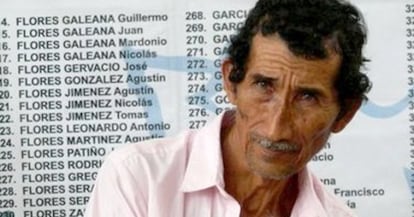Mexico searches for peasant activist who disappeared 41 years ago
Reward offered for information about rural leader who went missing during the dirty war


In a rare move, Mexican authorities have announced that they are actively investigating the disappearance of a community activist in Guerrero state who went missing 41 years ago.
On Monday, the Attorney General’s Office (PGR) said it was offering a 1.5-million-peso reward (about $900,000) for information leading to the arrests of those responsible for the disappearance of Rosendo Radilla, who was last seen in a military prison on August 25, 1974.
Prosecutors have also said they would give the money to anyone who can provide information concerning the whereabouts of his remains.
Prosecutors also want information concerning the whereabouts of Radilla’s remains
This new search by Mexico’s government is seen as a significant political move. The administration of President Enrique Peña Nieto has come under heavy fire from human rights activists and citizen groups for the way it handled the investigations into the disappearance of the 43 trainee teachers who went missing in September 2014, and a massacre of reputed traffickers by the military that took place earlier last year.
The trainee students were from the state of Guerrero, as was peasant community leader Rosendo Radilla.
Mexico has also struggled for years to stop the number of forced disappearances, which now number about 25,000 cases on file at the PRG. The administration is also hoping to make amends for the repression that took place in Guerrero during the 1960s and 1970s, when the country was governed by hardline presidents from Peña Nieto’s own Institutional Revolutionary Party (PRI).
Radilla was the president of the town council in Atoyac de Álvarez – the birthplace of Mexican guerrilla leader Lucio Cabañas, who was gunned down by soldiers in 1974.
Since 2008, the Inter-American Human Rights Court has been investigating Radilla’s disappearance, which was only officially recognized by the Mexican government during a public ceremony four years ago.
“The government will use all the resources at its disposal to calm the voices clamoring for justice, freedom and democracy. The forced disappearance of Rosendo Radilla was a case of repression that cannot go unpunished,” said Juan Marcos Gutiérrez, a Peña Nieto administration official.
According to the Guerrero Truth Commission, the Mexican government was responsible for the disappearance of 512 people between 1969 and 1985.
Mexico has 25,000 open cases of forced disappearances on file
Among the crimes committed were summary executions and “death flights” similar to the ones that took place in Argentina during the 1976-83 dictatorship, where victims were drugged and thrown off planes and helicopters into the sea.
Since the 43 students from Ayotzinapa went missing last year, the small town in Guerrero has become a symbol of Mexico’s dark past of repression in the state. It was in Guerrero, during the 1960s and 1970s, that rural teaching schools became centers of community activism.
Some, like Cabañas, joined the guerrilla movement while the subsequent PRI governments ordered police and military crackdowns against leftist leaders and activists in Mexico’s southern region.
Allegations that a corrupt police force in the town of Iguala took part in the disappearance of the 43 students on September 26, 2014 and indications that the local army battalion did nothing to help them remain as clear reminders of Mexico’s brutal regimes.
English version by Martin Delfín.
Tu suscripción se está usando en otro dispositivo
¿Quieres añadir otro usuario a tu suscripción?
Si continúas leyendo en este dispositivo, no se podrá leer en el otro.
FlechaTu suscripción se está usando en otro dispositivo y solo puedes acceder a EL PAÍS desde un dispositivo a la vez.
Si quieres compartir tu cuenta, cambia tu suscripción a la modalidad Premium, así podrás añadir otro usuario. Cada uno accederá con su propia cuenta de email, lo que os permitirá personalizar vuestra experiencia en EL PAÍS.
¿Tienes una suscripción de empresa? Accede aquí para contratar más cuentas.
En el caso de no saber quién está usando tu cuenta, te recomendamos cambiar tu contraseña aquí.
Si decides continuar compartiendo tu cuenta, este mensaje se mostrará en tu dispositivo y en el de la otra persona que está usando tu cuenta de forma indefinida, afectando a tu experiencia de lectura. Puedes consultar aquí los términos y condiciones de la suscripción digital.








































